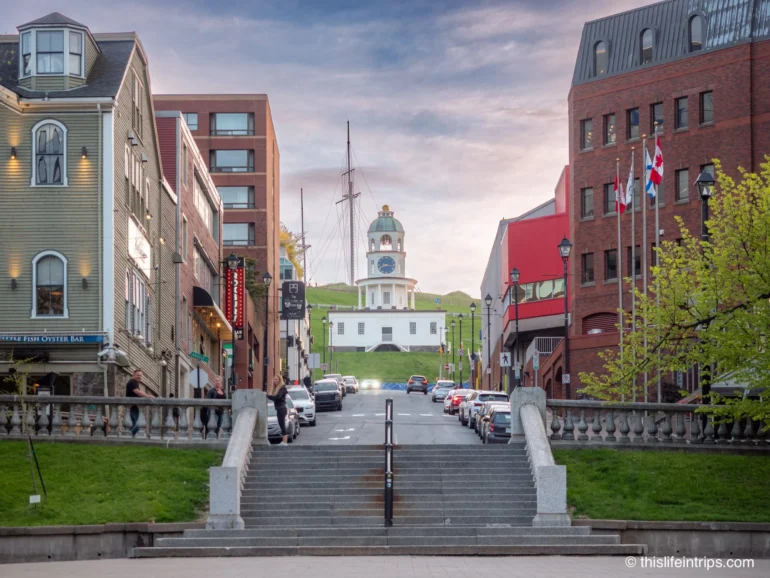In today’s economy, travel can feel out of reach—but it doesn’t have to be. While Instagram may tempt you with Caribbean beaches, Alpine views, and Amalfi Coast sunsets, you don’t need a luxury budget to see the world.
To help you scratch that travel itch without draining your wallet, we’ve curated 8 essential travel tips for Canadians. From planning to booking and getting around, here’s how to make your next adventure affordable and unforgettable.
1) Choose a Cheaper Destination
We all have dream spots—but let’s be real, some Canadian destinations are far pricier than others.
Rather than blowing your budget on big-name cities or popular tourist regions, opt for lesser-known gems that offer similar experiences for less. Here are some affordable swaps to consider:
- Quebec City instead of Montreal – Enjoy European charm, cobblestone streets, and French-Canadian culture—often with cheaper accommodations and fewer crowds.
- Edmonton instead of Calgary – Alberta’s capital has a thriving arts scene, massive festivals like K-Days and Fringe, and is typically more affordable for hotels and dining.
- Saskatoon instead of Winnipeg – Get prairie charm, riverside trails, and great local eats—without the big-city costs.
- Halifax instead of Vancouver – Looking for ocean views and vibrant food scenes? Halifax delivers West Coast vibes on an East Coast budget.
- Ottawa instead of Toronto – Canada’s capital has world-class museums, Parliament Hill, and scenic canal strolls—without Toronto’s sky-high prices.
Sometimes, the best way to save is to let the deals decide your destination. Use tools like Google Flights and Hopper to spot where airfare is cheapest and build your trip around that.
Alternatively, opt to stay close to home and look for local getaways – for some, a roadtrip might be more cost-effective and just as exciting!
2) Map Out All of Your Expenses (as Much as Possible)
Now that you have a better idea of where you’re going, map out every possible expense.
You’ll want to note costs like:
- Travel insurance
- Transportation (flights, rental cars, taxis)
- Accommodations (hotels, rental properties, shared housing)
- Food (dining out, groceries)
- Activities (excursions, tours, exhibits)
- International SIM cards and data plans
- And extra cash for tips and souvenirs
Never discard an early-bird discount. Whenever you can, prepay your expenses – including accommodations, activities, or transportation. After all, last-minute bookings can be costly! As a backup, make sure all bookings are fully (or at least partially) refundable—and keep a little extra budget aside in case you need to fight a traffic ticket.
For peace of mind, incorporate some extra cash into your budget; this cushion helps cover unexpected costs and emergencies.
Speaking of cash, slip some loose change into your pockets for smaller purchases, or to limit tapping into your credit. When it comes to cash, you’ll need to be equipped with the right currency.
To collect the appropriate coin, visit your bank, a foreign exchange office, or consider ordering foreign currency online (a service offered by some financial institutions). When selecting your destination, see how far the Canadian dollar will take you. Depending on the exchange rate of the location, you might be able to spend more abroad, all while withdrawing less from the bank.
Tip: Always compare bank exchange rates and online services for the most competitive offer. Try to avoid airport kiosks if possible – they’re known to overcharge.
3) Book at the Right Time

There are certain sweet spots for booking travel online, particularly hefty expenses like airfare.
Generally, booking your flight anywhere from 4 to 10 months prior to your departure is a safe practice for securing better deals, especially for international travel. In many cases, it’s also cheaper to travel in the middle of the week rather than the weekend.
When it comes to domestic flights, you can occasionally catch some deals by booking only a couple of months ahead or at the last minute – although cutting your bookings too close is risky for those on a budget, since you’re not guaranteed a better price.
Budgets are all about planning, so booking in advance is your best bet for locking down a discounted flight or vacation package.
Since flight costs vary by airline, destination, and supply and demand, timing your bookings is a tedious task. To simplify the process, utilize cross-search tools like Point.me, Pointhound, or Skyscanner. These price trackers use comprehensive search engines and filters to rank and compare the best available flight deals. To optimize these features even further, set up alerts that notify you of price drops.
Tip: When your trip takes place also matters. Many destinations have peak seasons, like Tokyo in the spring, or summertime in Paris. The trick here is to find pockets of time when your destination is less congested. As the crowds grow, so do the prices.
4) Seek Affordable Accommodations
Sometimes, to find affordable accommodations, you need to look beyond hotels – especially those that flaunt 5-star ratings.
Sure, hotel stays can be cost-effective when they’re part of a vacation package or paid for by points – but other temporary housing arrangements like Airbnb rentals, hostels, or home-shares can be just as cozy and convenient.
Travelling during shoulder seasons can also help you cut down on accommodation costs.
Alternatively, if you’re not opposed to a furry travel companion, there are programs where you stay at someone else’s home in exchange for pet-sitting services.
Tip: Have family in another country? If so, book a trip where there’s already a couch to crash on.
5) Take Public Transportation
So, you snagged that discounted flight and just checked into your budget-friendly abode. Now what? Naturally, it’s time to budget getting from point A to point B.
Taxis, rental cars, and rideshare programs are convenient, but they tend to get expensive. Instead, opt for public transportation. Keep in mind, however, that you may need to brush up on a foreign subway system or bus route beforehand.
6) Be Picky About Activities
While it’s tempting to hit every museum, landmark, temple, or tour available – budgeting requires you to be mindful. Part of being mindful means being selective. Prioritize must-do activities over whims and prebook when possible for better pricing. Spontaneously stumbling upon random activities and excursions might lure you into tourist traps – which are typically overpriced.
There are also tons of complementary experiences in most cities – like park-hopping, photo-ops, or self-guided exploration using the pamphlet you picked up at the bus station.
Tip: Some locations allow you to purchase a city pass that provides discounts on both activities and transportation.
7) Budget Every Bite
Truthfully, you don’t have to preplan every plate, but you can give yourself a rough idea of how much you want to spend each day on food – especially dining out.
To make things easier, research and reserve restaurant outings in advance. This gives you a chance to glance over menu prices and avoid settling for something overbudget simply because it’s nearby and you’re hungry.
Tip: If your accommodations have a kitchen or refrigeration, purchase a few groceries to balance out your food budget.
8) Get a Travel Credit Card
The answer to budget-friendly vacations could very well be a piece of plastic.
Travel credit cards are packed with loyalty programs, trip insurance, and perks that effectively reduce travel costs.
The best travel credit cards allow you to collect and redeem points on travel, creating an optimized system for adventurous spenders. Travel redemptions cover everything from flights to hotel stays.
Instead of purchasing a separate insurance package, apply for a credit card with comprehensive travel coverage. There are tons of cards with valuable coverage categories like trip interruption and trip cancellation insurance, flight and baggage delay insurance, and emergency medical insurance.
Top contenders also include premium travel perks like airport lounge access, travel credits, and no foreign transaction fees (a benefit that voids that 2.5% fee on international purchases).
The Scotiabank Passport Visa Infinite Privilege Card offers all of these perks and more. On top of a lucrative welcome bonus, expect plenty of Scene+ points for every dollar you spend on eligible travel purchases, including bonus points on hotel bookings, car rentals, and experiences booked through Scene+ Travel.
In addition, enjoy 13 insurance categories, a $250 annual travel credit on Expedia bookings, complimentary airport lounge access through the DragonPass (unlocking free visits to popular lounges like Plaza Premium Lounges), and no foreign transaction fees.
To account for all of these benefits, however, the Scotiabank Passport Visa Infinite Card comes with a high annual fee of $599. Similarly, you’ll need to meet some high annual income requirements of $150,000 per individual or $200,000 per household.
You can offset the annual fee by taking full advantage of the card’s perks and rewards. Lower-income travellers can apply for the Visa Infinite version instead. The Scotiabank Passport Visa Infinite Card offers fewer perks but keeps essential benefits like no foreign transaction fees and Scene+ points for travel.
Tip: To browse more travel credit cards, check out the FinlyWealth credit card finder tool. This tool ranks, compares, and categorizes all the top credit cards in Canada. Simply adjust the filters based on your spending habits, and uncover your perfect travel companion. You can also apply our “Best for Travel” quick filter to jumpstart your search.
Thoughts on These Travel Tips for Canadians?
Your next trip doesn’t need to break the bank. These smart travel tips for Canadians can help you save by choosing budget-friendly destinations, booking early, and managing accommodations, meals, and transportation wisely.
Better yet, apply for a travel credit card like the Scotiabank Passport Visa Infinite Privilege Card—or one of the many great travel cards in Canada. You’re one application away from the vacation—and price point—of your dreams!
Travel Tips for Canadians FAQs
What are the top travel budget tips for Canadians?
Canadians can save money on travel by booking less touristy destinations, securing flights early, taking public transportation, and planning their expenses carefully.
How does a travel credit card save you money on a trip?
Travel credit cards earn cardholders points on travel expenses, which can later be redeemed towards future travel bookings. Premium travel credit cards also come with extensive travel insurance and exclusive perks that cut extra costs.
When should you book flights for cheaper airfare?
Typically, booking international flights 4 to 10 months in advance gets you the best deals. Alternatively, domestic flights might have last-minute price drops, but these decreases are never guaranteed.
What are some affordable alternatives to hotels?
Airbnb rentals, hostels, and home-share arrangements are great alternatives to hotels. You can also crash with relatives or pet-sit in exchange for a place to stay.
What say you?
Thoughts on these Budget Travel Tips for Canadians?
Let’s hear it!








